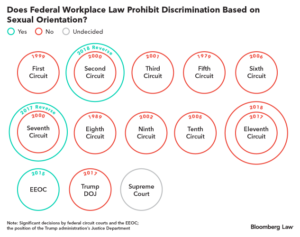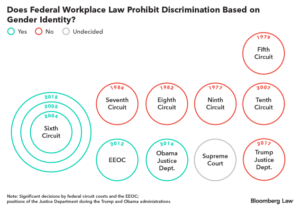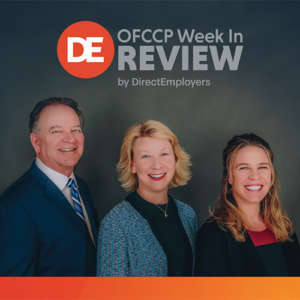Monday, April 22, 2019: Supreme Court to Rule Whether “Sex” Discrimination Prohibition also Prohibits Sexual Orientation Discrimination
The U.S. Supreme Court granted a writ of certiorari to hear three cases involving the interpretation of sex discrimination under Title VII of the Civil Rights Act of 1964 (“Title VII”). Granting certiorari means that at least four of the justices determined that the circumstances described in the petition are sufficient to warrant the Court’s review.
Questions Presented
- Whether the prohibition in Title VII of the Civil Rights Act of 1964, 42 U.S.C. § 2000e-2(a)(1), against employment discrimination “because of…sex” encompasses discrimination based on an individual’s sexual orientation.
The Court consolidated the following two cases and will allow one hour of oral argument.
| Case | Summary |
|
ALTITUDE EXPRESS, INC., ET AL. V. ZARDA, MELISSA, ET AL. 883 F. 3d 100, Court of Appeals, 2nd Circuit 2018 Decided 2/26/18
|
The case involves the late Donald Zarda, a New York skydiving instructor who claimed he was fired from his job because he told a client he was gay. Lambda Legal filed a friend-of-the-court brief in support of Zarda’ s estate and argued the case before the Second Circuit. The Second Circuit Court of Appeals held that Title VII prohibits discrimination based on sexual orientation. The employer appealed. |
|
BOSTOCK, GERALD L. V. CLAYTON COUNTY, GA. 883 F.3d 100, Court of Appeals, 11th Circuit 2018
Decided 05/10/18 |
The case involves Gerald Bostock, a gay man who claimed his former employer, Respondent Clayton County, Georgia, fired him because of his sexual orientation. He asserts that, after the County learned of his sexual orientation, his participation in a gay recreational softball league, and his promotion of volunteer opportunities with the County to league members, the County falsely accused him of mismanaging public funds as a pretext for terminating his employment because of his sexual orientation. The Eleventh Circuit Court of Appeals held that Title VII permits discrimination based on sexual orientation. The employee appealed. |
- Whether Title VII prohibits discrimination against transgender people based on (1) their status as transgender or (2) sex stereotyping under Price Waterhouse v. Hopkins, 490 U. S. 228 (1989).
|
R.G. & G.R. HARRIS FUNERAL HOMES V. EEOC, ET AL. Court of Appeals, 6th Circuit
Decided 03/07/18 |
The case involved a transgender female employee who claimed that she was terminated from her position as a funeral director after she informed her employer that she would be transitioning from a biological male to a female. At the district court level, the court dismissed the claim, finding that Title VII does not expressly protect against discrimination on the basis of gender identity and specifically transgender status.
However, on appeal, the Sixth Circuit reversed and held that because Title VII protects against such things as sex stereotyping, and because transgender discrimination is in fact based on non-conformance of an individual’s gender identity and their appearance (with what otherwise goes along with the norms of their biological sex) then therefore transgender discrimination is in fact discrimination on the basis of sex. |
Current Legal Landscape

Source: “Supreme Court Can Settle Split on LGBT Bias in the Workplace“; Bloomberg Law

Source: “Supreme Court Can Settle Split on LGBT Bias in the Workplace“; Bloomberg Law
To see interactive equality maps by each state, visit the Movement Advancement Project.
Bandaid or Permanent Fix?
As the U.S. Supreme Court looks to help provide some clarity and consistency with the various interpretations by the federal District Courts, The House of Representatives proposed the latest of over 40 years of failed federal Legislative efforts to make SO and GI discrimination unlawful under Title VII of the 1964 Civil Rights Act. The Equality Act (H.R. 5) seeks to amend existing civil rights law, including Title VII, to explicitly make unlawful, discrimination based on sexual orientation and/or gender identity.
Thursday, April 25, 2019: EEO-1 Pay Data – Back On!
Judge Tanya S. Chutkan of the U.S. District Court for the District of Columbia ordered that the Equal Employment Opportunity Commission (“EEOC”) collect EE0-1 Component 2 (pay and hours worked data) for calendar years 2017 and 2018 (and impliedly 2020 pay and hours worked data to be collected in 2021). However, Judge Chutkan went on to give the EEOC the option to collect 2019 data in lieu of 2017 data, which would be due during the 2020 EEO-1 reporting period. Here is the full transcript of Judge Chutkan’s oral Order, including the below passage recording the Judge’s dissatisfaction with the EEOC’s, OMB’s and the US Department of Justice’s handling of this issue:
“…it is important not to lose track of the fact that the Government is in this position because of its own actions, including the Government’s unlawful stay, the Agency’s failure to engage in a review during the stay, EEOC’s failure to prepare any type of contingency plan for Component 2 data collection, and the incorrect and incomplete information regarding timing for compliance provided by the Government to the Plaintiffs and to the Court.”
Important Deadlines Judge Chutkan Ordered, and other dates the EEOC has advised the Court it is following:
Monday, April 29, 2019
- EEOC must state on its website that 2018 Component 2 data is due no later than September 30, 2019
- EEOC must “alert filers” of its intent to gather either 2017 or 2019 pay data UNLESS it has not decided, in which case, the deadline moves to May 3, 2019
Friday, May 3, 2019
- EEOC to inform the Court if it plans to gather 2019 data instead of 2017 data
- EEOC to inform the Court of its collection progress (and every 21 days from this date on)
Friday, May 31, 2019
- Employers: EEO-1 Component 1 data due
Monday, July 15, 2019
- EEOC has previously indicated its intention to open its EEO-1 Component 2 reporting portal
Monday, September 30, 2019
- Employers: EEO-1 Component 2 (pay data) 2018 due “last” day
- Employers: EEO-1 Component 2 (pay data) 2017 due (unless 2019 data selected – see May 3rd deadline)
- Note: Judge Chutkan also, however, ordered the EEOC to keep its Component 2 reporting portal open until the usual number of employers which file EEO-1 Surveys report their Component 2 data
April 5, 2021
- Expiration of the revised EEO-1 form including Component 2 (barring further interruptions of the approval or extension)
Need the backstory?
View the information as previously reported:
- OFCCP Week In Review: April 22, 2019
- OFCCP Week In Review: April 1, 2019
- OFCCP Week In Review: March 11, 2019
What Could Stop Reporting?
- OMB could appeal and seek/obtain a Stay of Judge Chutkan’s Order; or
- OMB does not appeal, Judge Chutkan’s Order becomes a Final Order now subject to legal challenge, and one or more employer groups sue successfully to stop the reporting
- Note: The next few weeks could prove eventful. Expect many new developments and updates weekly.
Reminder: Countdown to DEAM19!
DEAM19 – Gain access to the full conference details, check out what’s on the agenda, and register to attend!
Compliance Spotlight
As an advocate for individuals with disabilities and strong ties to the community itself, OFCCP Director Craig Leen will chat with Haley Moss, recognized as Florida’s first practicing lawyer with autism, in our inaugural DE Talk.
Reminder
Ask your compliance questions for John Fox & Candee Chambers in advance!
THIS COLUMN IS MEANT TO ASSIST IN A GENERAL UNDERSTANDING OF THE CURRENT LAW AND PRACTICE RELATING TO OFCCP. IT IS NOT TO BE REGARDED AS LEGAL ADVICE. COMPANIES OR INDIVIDUALS WITH PARTICULAR QUESTIONS SHOULD SEEK ADVICE OF COUNSEL.
SUBSCRIBE.
Compliance Alerts
Compliance Tips
Week In Review (WIR)
Subscribe to receive alerts, news and updates on all things related to OFCCP compliance as it applies to federal contractors.
OFCCP Compliance Text Alerts
Get OFCCP compliance alerts on your cell phone. Text the word compliance to 55678 and confirm your subscription. Provider message and data rates may apply.


